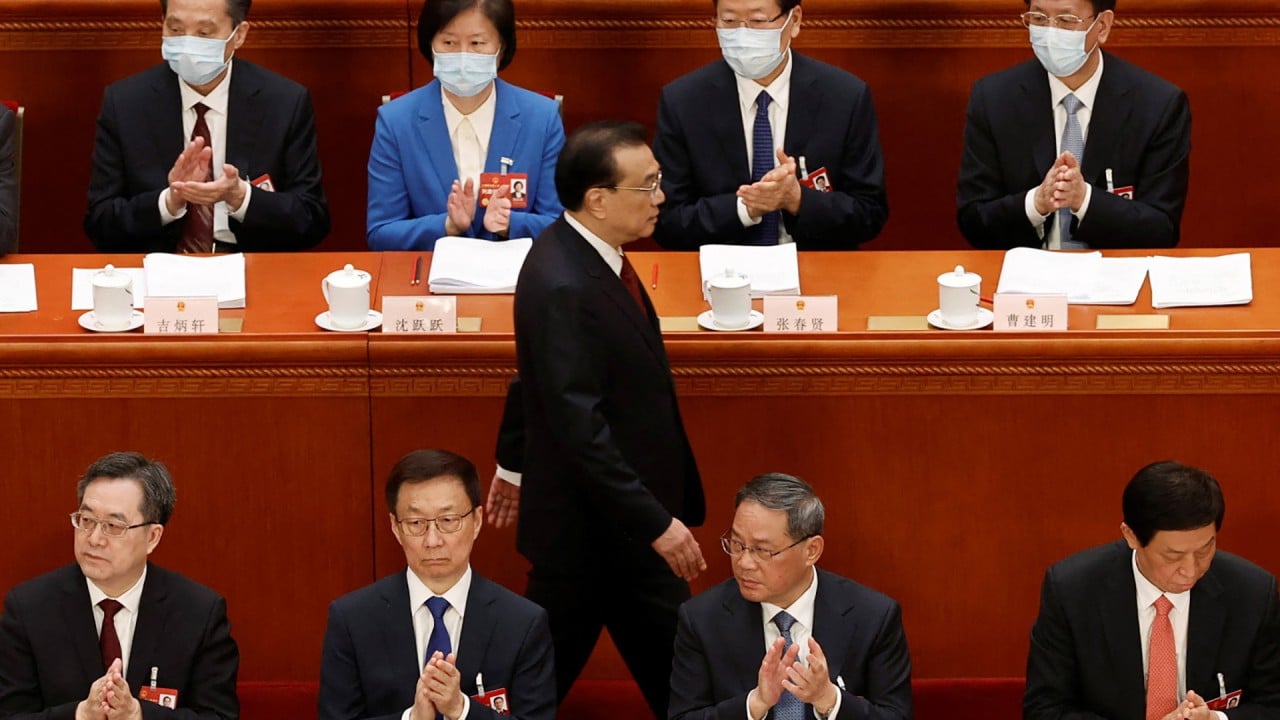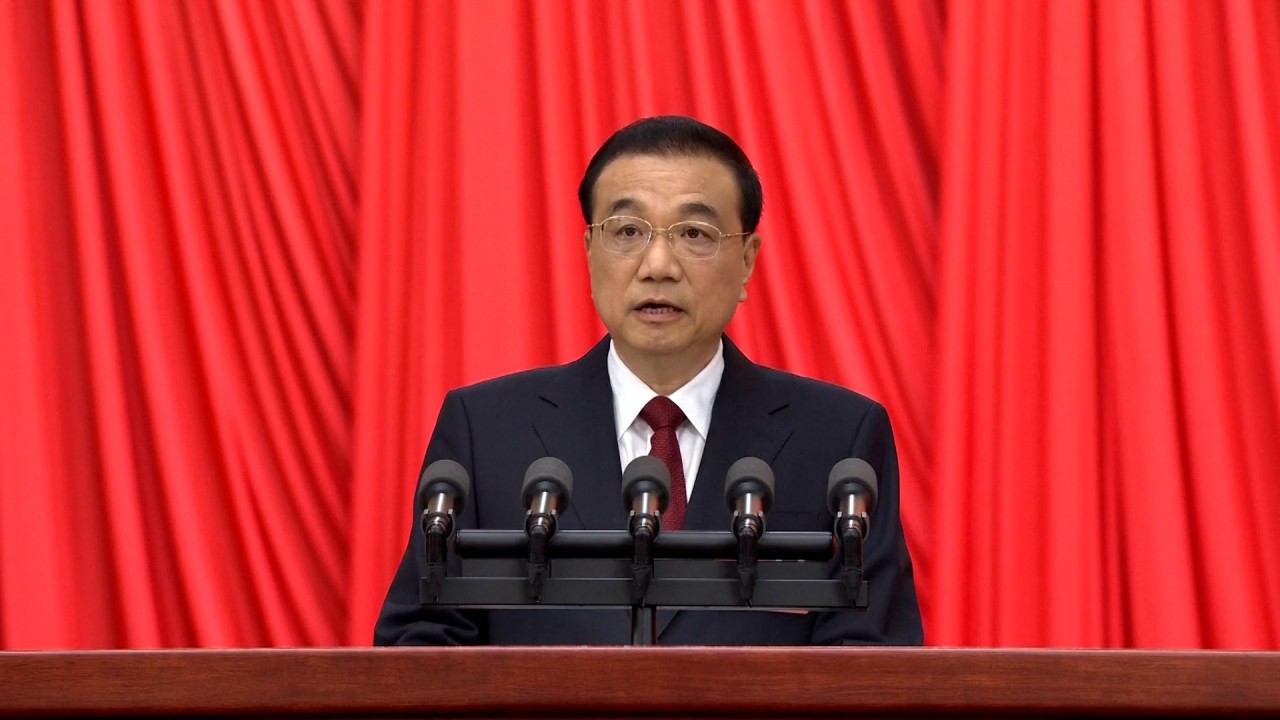
Whatever happened to Likonomics? Chinese Premier Li Keqiang heads for the exit
- Li promoted the private economy, foreign investment and simpler government procedures – even when his power waned
- But he is ‘the least influential premier compared with his predecessors Zhu Rongji and Wen Jiabao’, says political analyst
Li, 67, who will retire at the end of this week, delivered his swan song flatly, revealing nothing of himself. He devoted most of his time at the podium to talking about the government’s performance in the past five years and touched only briefly on its plans for the future.
He began the speech by saying the term of this government was “about to come to a close” and finished it by rallying support for the Communist Party’s Central Committee with “comrade Xi Jinping at its core”.
When he walked back to his chair, there was no obvious eye contact between Li and Xi who sat next to him. Li’s return to his seat was only interrupted by the longer-than-expected applause from the nearly 3,000 NPC deputies.
The outgoing premier stood up and bowed to thank the audience briefly, before the media spotlight shifted away.
Although widely regarded as a political weakling by domestic and overseas observers, Li was consistent in pushing the private economy, foreign investment and simplified government procedures – even when his power was diminished by Xi’s introduction of party committees to oversee the economy, diplomacy, finance, reforms and other matters.
“Li is a scholarly figure with an international vision and a fair understanding of economics,” said Liu Shengjun, director of the Shanghai-based China Financial Reform Research Institute.
“He will be remembered for his commitment to reform. He was full of reform aspirations at the beginning [of his premiership]. But as things became complicated, it was hard for him to press ahead with them.”
With a bachelor’s degree in law and a doctorate in economics from the renowned Peking University, Li is arguably one of the best-educated Chinese leaders.
Before he became premier in 2013, he was widely known for adopting a combination of indicators to take the pulse of China’s often opaque economy. Li told foreign diplomats that as provincial party chief of Liaoning he used railway cargo volume, electricity consumption and bank loans as gauges to weigh the inflated GDP figures reported by local governments.
Andrew Collier, an analyst with GlobalSource Partners in Hong Kong, said: “Li’s influence has waned under Xi Jinping because his instincts as a moderate free-market liberal were in contrast to the focus on state ownership.
“But as a strong technocrat, he was a steady hand guiding the central bank and the other wheels of finance and economics in China.”
Li is believed to have played a big role in the Communist Party’s third plenum reform agenda. The meeting in November 2013 pledged a “decisive role” for markets in China’s economy. And for the first time it said the private sector should be on an equal footing with state-owned enterprises.
However, the meeting also announced the launch of a leading party committee to oversee all aspects of comprehensive reform policies, with Xi as the team leader and Li as one of four deputy heads, marking a dilution of Li’s power.
Despite being overshadowed by Xi on international affairs, Li, who is a fluent English speaker, remained a genial, pragmatic and open-minded figure in overseas business circles, foreign business leaders in China told the South China Morning Post.
Domestically, he was focused on simplifying administrative procedures, cutting tax burdens for small and microbusinesses and boosting mass entrepreneurship and innovation.

Neil Thomas, a political analyst previously with the New York-based Eurasia Group, said Li’s “most lasting achievement” as premier could be the initiative overseeing improvements to China’s business environment by delegating official powers, streamlining administrative procedures and optimising government services.
“While this campaign has not generated splashy headlines, it has made life simpler for countless Chinese businesses,” Thomas said.
“Li will be remembered for his efforts last year to encourage local officials to focus on economic recovery during a wave of Covid-induced lockdowns. These efforts did not represent a political challenge to Xi but they did show Li’s technocratic leadership skills and concern about China’s economic future.”
Under Li’s watch, the government slashed 7.6 trillion yuan (US$1.1 trillion) of taxes and fees over the five years to 2020, with the ratio of government tax revenues to GDP down by around 3 percentage points to 15.2 per cent, official data showed. To support companies amid the Covid-19 pandemic, the government granted 1.1 trillion yuan in tax breaks for companies in 2021 and approved 4.2 trillion yuan in cut and delayed taxes last year.
While lower taxes were needed in China to relieve companies’ heavy tax burdens, the effect was countered by local governments found levying various fees from companies to boost coffers, according to mainland media reports.
Li’s signature project of mass entrepreneurship initially generated enthusiasm for people to set up their own businesses as well as an investment frenzy in start-ups, before peer-to-peer (P2P) loan platforms collapsed, threatening social stability.
Chen Daoyin, an independent political scientist and former Shanghai-based professor, said Li should be accountable for the poor regulatory oversight on the P2P sector, which caused many households to lose their savings and led to widespread social discontent.
“The failure of the mass entrepreneurship drive in Li’s first term paved the way for his power dilution,” Chen said.
“Since then, Li has descended to be an official dealing with day-to-day matters, instead of a politician with vision,” Chen said. “Ranked second in China’s political hierarchy, he should have fought for the legitimate administrative power of the State Council and defended the principle of ‘separation between party and government’, a concept coined by late paramount leader Deng Xiaoping in the 1980s to prevent party cadres meddling in government affairs.
“But he didn’t, or failed, which makes him the least influential premier compared with his predecessors Zhu Rongji and Wen Jiabao,” Chen said.
Li has never mentioned political reforms. During a recent visit to the National Development and Reform Commission, China’s top economic planner, Li appeared to give a farewell speech to the officials greeting him, saying China’s economic reform still needed to be “comprehensively promoted”.
“The first priority is development, and the fundamental driving force is reform, and these are now entrusted to you,” Li said in a video circulating online.



